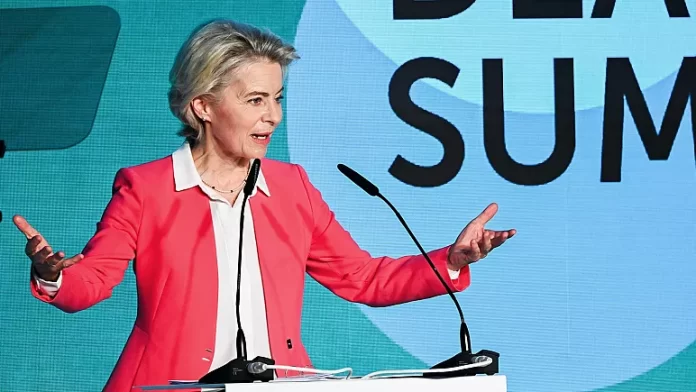European Commission President Ursula von der Leyen welcomed the idea of industrial subsidies for nuclear power, which is highly controversial in the EU.
In a speech in the Czech Republic, one-third of whose energy resources come from nuclear power plants, von der Leyen stated that each member state was free to choose its own path to climate neutrality.
“The choice of the energy mix is and will remain a national prerogative. We know that nuclear plays a central role in Czechia’s energy system and that it will continue to require investment to play its role in the Czech energy transition. And this is why we’re always willing to consider state aid, of course, provided the conditions are right. But this is important.”
The European Commission has the power to approve or reject public funds that governments invest in their national industries in the form of grants, reduced prices, tax cuts, etc.
If the regulatory body considers that government intervention poses an excessive risk to the single market and other countries of the bloc, it has the right to reject this proposal. The principles of fairness and equality that defined the policy of the European Commission since the inception of European integration are enshrined in EU legislation.
However, the tightening of global competition and rising costs of the green and digital transition have led some Member States to call for greater flexibility to support their domestic companies and prevent industry collapse.
In response, the Commission made small concessions: earlier this year it relaxed the rules for approving subsidies in six key areas of green technology transition. These include batteries, solar panels, wind turbines, heat pumps, electrolysers and carbon capture technologies
Brussels has also introduced the Zero Industry Act, designed to significantly increase domestic production of these essential products.
The initial draft of the law excludes nuclear technologies from the list of “strategic projects” and contains only references to “advanced technologies producing energy from nuclear processes with minimal waste” and “small modular reactors.”
We support cutting-edge nuclear technology under our Net-Zero Industry Act to boost innovation and cross-border cooperation.
Currently, Member States and the European Parliament are negotiating the inclusion of nuclear energy in the law’s list as a “strategic project.” However, the nuclear issue is highly divisive across the EU, with most countries sharply split into pro- and anti-nuclear factions.
France, which gets about 70 per cent of electricity from its vast network of reactors, leads the pro-nuclear group supported by countries such as the Czech Republic, Bulgaria, Hungary, Poland, Romania and Slovakia. Together they claim that nuclear power, as a low-carbon technology, can operate 24 hours a day and reduce external dependence.
In contrast, Germany, the bloc’s industrial power, has taken an uncompromising anti-nuclear stance, supported by Spain, Portugal, Austria, Denmark and Luxembourg. They believe that promoting nuclear power amounts to green-washing because of the carbon footprint of uranium mining and long-term radioactive waste.
Both sides have formed alliances and are trying to attract additional countries to secure the qualified majorities needed to approve energy and climate legislation.
Czech Prime Minister Petr Fiala:
“I reminded the president of the European Commission that nuclear energy is really important for the Czech Republic. It’s a traditional industrial sector in our country. (It’s) one of the ways for our country to achieve the climate objectives and to have sufficient sources of energy.”
He also noted the importance of nuclear energy as one of the clean energy sources in the Czech Republic:
It’s important that nuclear energy remains one of the preferred sources of clean energy in the Czech Republic. And we’re doing our best so that nuclear energy stays the accepted source of energy.
Fiala stated his team is reviewing tenders to expand the capacity of the Dukovany nuclear power plant, which houses four of the country’s six nuclear reactors. He also pointed the government was preparing a notification for the Commission to be considered before taking a decision on the subsidies.
“The completion of the notification process is a huge priority for us. I’m happy that after today’s discussion with the president, I can see there is a chance that we will succeed with the notification process.”
